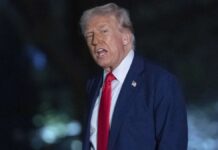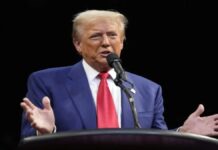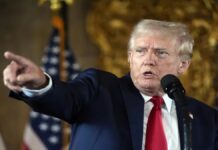
After skirting the issue for weeks, President Donald Trump offered an embrace Wednesday of the fringe internet phenomenon QAnon, praising its followers for supporting him and shrugging off its outlandish conspiracies.
His comments reflected the highest-profile endorsement to date of the group, which has infiltrated Republican circles even as party leaders attempt to distance themselves.
“I don’t know much about the movement other than I understand they like me very much, which I appreciate,” Trump said in the White House briefing room.
It was a striking nod to a group that has been likened to a virtual cult and has been labelled a potential domestic terrorist threat by the FBI.
Trump admitted he wasn’t intimately familiar with some of the sprawling conspiracies offered by the group’s followers but said he understood it was becoming more widespread.
“I have heard that it’s gaining in popularity,” Trump said, suggesting QAnon followers approved of how he’d handled social unrest in places like Portland, Oregon. “I’ve heard these are people that love our country and they just don’t like seeing it.”
QAnon’s prevailing conspiracy theories — none based in fact — claim dozens of Satan-worshipping politicians and A-list celebrities work in tandem with governments around the globe to engage in child sex abuse. Followers also believe there is a “deep state” effort to annihilate Trump.
But followers of the group have expanded from those beliefs and now allege baseless theories surrounding mass shootings and elections. Followers have falsely claimed that 5G cellular networks are spreading the coronavirus.
The group has also peddled conspiracies about coronavirus, the Black Lives Matter movement and vaccines — none grounded in reality.
Trump is revered among the conspiracy’s followers, who believe he was recruited to help eliminate the controlling criminal conspiracy they allege is gripping the world’s power structures.
Trump did not seem entirely familiar with all that on Wednesday. Instead, he focused on the group’s praise for him — which was enough, apparently, to overlook the cultish beliefs.
Asked if he believed the crux of the theory, described by a reporter as the belief that the President “is secretly saving the world from this satanic cult of paedophiles and cannibals,” Trump said: “Well, I haven’t heard that, but is that supposed to be a bad thing or a good thing?”
“If I can help save the world from problems, I’m willing to do it,” he went on. “I’m willing to put myself out there. And we are, actually, we’re saving the world from a radical left philosophy that will destroy this country.”
At the congressional level, Republicans have at least three nominees who have been sympathetic or supportive of the group: Jo Rae Perkins, the GOP nominee for a Senate seat in Oregon; Marjorie Taylor Greene, who won a primary runoff for Georgia’s 14th District last week; and Lauren Boebert, who beat a Trump-backed, five-term incumbent in the primary in Colorado’s 3rd District in June. Greene and Boebert are running in districts where Republicans are favoured.
Asked earlier Wednesday about Trump’s support for QAnon, his press secretary insisted it wasn’t a matter she’d ever heard him discuss.
“I’ve never heard of that. There’s a lot of media focus on that but certainly never heard of that from the President,” press secretary Kayleigh McEnany said.
She described the President’s support for anti-Muslim candidates like Laura Loomer, who won a primary in Florida on Tuesday, and Greene as automatic because they are Republicans.
“The President routinely congratulates people who officially get the Republican nomination for Congress, so he does that as a matter of course,” McEnany said. “He hasn’t done a deep dive into the statements by these two particular women. I don’t know if he’s even seen that. But he supports the Muslim community, he supports the community of faith more broadly in this country.”
The campaign of Democratic nominee Joe Biden responded to Trump’s comments, accusing the President of “giving voice to violence.”
“After calling neo-Nazis and white supremacists in Charlottesville ‘fine people’ and tear-gassing peaceful protesters following the murder of George Floyd, Donald Trump just sought to legitimize a conspiracy theory that the FBI has identified as a domestic terrorism threat,” campaign spokesman Andrew Bates said in a statement. “Our country needs leadership that will bring us together more than ever to form a more perfect union.”











